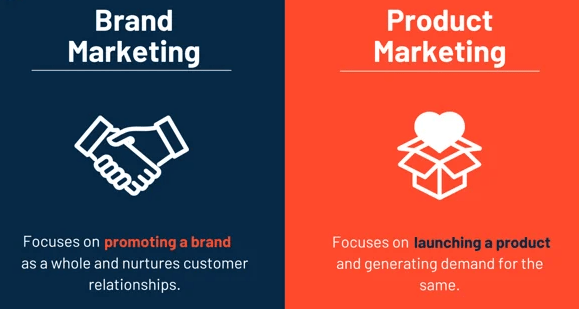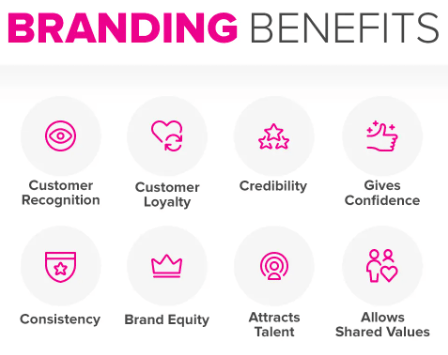Confused about the difference between brand marketing and product marketing? You’re not alone. Many businesses struggle to understand these crucial, yet different aspects of their strategy.
This blog post will provide valuable insights into both concepts, outlining their unique benefits as well as how they can work together for your business success. Ready to unlock the full potential of your marketing efforts? Let’s dive in!
Key Takeaways
- Brand marketing focuses on establishing a strong brand image and emotional bond with customers, while product marketing highlights the unique features and benefits of specific products.
- Both types of marketing are crucial in a comprehensive strategy, with brand marketing fostering customer loyalty and long-term relationships, and product marketing driving immediate sales.
- Brand marketing aims to create lasting impressions and build reputation over time, while product marketing is more short-term oriented to drive immediate sales.
- The synergy between brand marketing and product marketing is essential for maximizing the impact of both strategies in attracting and engaging customers.
Brand Marketing vs Product Marketing: Understanding the Difference

Brand marketing and product marketing serve different objectives, have distinct target audiences and messaging, vary in timeframe and longevity, but both play crucial roles in an effective marketing strategy.
Different objectives and focus
Brand marketing aims to establish connections and foster relationships between a company and its customers. It endeavors to create an enduring brand image, focusing on the values, mission, reputation, and emotional bond with consumers.
Contrarily, product marketing zeros in on specific products or services offered by the company. Its main objectives are driving sales, developing effective promotional strategies for each item or service while emphasizing their unique features and benefits.
The focus is often short-term market reactions related to specific launches or campaigns.
Target audience and messaging
Target audience and messaging play a crucial role in both brand marketing and product marketing. In brand marketing, the target audience is usually broader, focusing on creating awareness and building a strong brand identity among a wide range of consumers.
The messaging in brand marketing aims to communicate the values, mission, and reputation of the company, establishing an emotional bond with customers. On the other hand, product marketing targets a more specific audience by highlighting unique features and benefits of individual products.
The messaging in product marketing focuses on providing detailed product information to drive sales and generate revenue. Both types of marketing require strategic messaging that aligns with the overall marketing strategy to effectively reach their respective audiences.
Timeframe and longevity
Brand marketing and product marketing differ in terms of their timeframe and longevity. Brand marketing focuses on creating a long-lasting impression and building a reputable image for the company over time.
It aims to establish brand recognition, loyalty, and emotional connection with customers, which can lead to sustainable business growth. On the other hand, product marketing is more short-term oriented, aiming to drive immediate sales by highlighting unique features and benefits of specific products.
While both types of marketing are important in a comprehensive strategy, it is essential to maintain a balance between long-term brand building and short-term product promotion.
Importance of both in a marketing strategy
Both brand marketing and product marketing play crucial roles in a comprehensive marketing strategy. Brand marketing helps to establish a strong identity and reputation for a company, fostering customer loyalty and emotional connections.
It focuses on building long-term relationships with customers and creating brand equity. On the other hand, product marketing highlights the unique features and benefits of specific products or services, driving sales in the short term.
By aligning both brand and product messaging, businesses can maximize their visibility, awareness, and sales potential. In order to achieve success in today’s competitive marketplace, it is important to recognize the significance of both brand marketing and product marketing within an overall marketing strategy.
Check out our article about Brand Manager and Marketing Manager.
Advantages and Benefits of Brand Marketing

Creating a strong brand identity can differentiate your business from competitors and establish lasting customer loyalty. Read on to learn more about the advantages and benefits of brand marketing.
Creating a strong brand identity
Creating a strong brand identity is essential for any business looking to establish itself in a competitive market. A strong brand identity helps customers recognize and remember your company, products, and values.
It involves crafting a unique image that reflects your mission, reputation, and the emotional bond you want to create with your target audience. By consistently showcasing your brand through logos, colors, slogans, and messaging across different marketing channels, you can build name recognition and develop a positive reputation in the minds of consumers.
This not only increases awareness but also fosters customer loyalty and trust while differentiating yourself from competitors. Developing a strong brand identity takes time and effort but has long-term benefits for business growth.
Fostering customer loyalty and emotional connection
Brand marketing plays a crucial role in fostering customer loyalty and emotional connection. By consistently communicating a brand’s values, mission, and reputation through various channels, companies can develop a deep bond with their customers.
When customers feel connected to a brand on an emotional level, they are more likely to remain loyal and continue supporting the business over time. This loyalty not only drives repeat purchases but also encourages customers to become advocates for the brand, spreading positive word-of-mouth and helping to attract new customers.
Ultimately, fostering customer loyalty and emotional connection is essential for long-term business growth and success.
Learn the Difference between Marketing and Branding.
Building brand equity and reputation
Building brand equity and reputation is crucial for the long-term success of any business. By consistently delivering high-quality products or services, a company can establish itself as reliable and trustworthy in the eyes of consumers.
This not only helps to attract new customers but also fosters loyalty among existing ones. A strong brand image can differentiate a company from its competitors and create a positive perception in the market.
Through effective marketing strategies, such as advertising campaigns and social media presence, businesses can enhance their visibility and build a solid reputation that resonates with their target audience.
Long-term impact on business growth
Brand marketing has a significant long-term impact on business growth. By creating a strong brand identity, companies can foster customer loyalty and emotional connection. This not only builds brand equity and reputation but also establishes a lasting relationship with customers.
A well-established brand attracts repeat purchases and referrals, contributing to sustained sales growth over time. Additionally, a strong brand allows businesses to position themselves as market leaders and set premium prices for their products or services.
Ultimately, the long-term impact of effective brand marketing is increased market share, profitability, and sustainable business growth.
Advantages and Benefits of Product Marketing

Product marketing focuses on highlighting the unique features and benefits of a specific product, driving sales and revenue for the company.
Highlighting unique features and benefits
Product marketing plays a crucial role in highlighting the unique features and benefits of a specific product. By focusing on what sets the product apart from competitors, marketers can effectively communicate its value to target customers.
This is done through persuasive messaging that emphasizes the benefits consumers will experience by using the product. By showcasing these unique features and benefits, companies can drive sales, generate revenue, and attract new customers who are drawn to the distinct advantages offered by their products.
Effective product marketing provides detailed information about the product’s functionality and how it solves consumer pain points, making it an essential component of any successful marketing strategy.
Driving sales and generating revenue
Product marketing plays a crucial role in driving sales and generating revenue for a business. By highlighting the unique features and benefits of a product, marketers can effectively persuade customers to make a purchase.
Through compelling advertising campaigns and persuasive messaging, product marketing aims to create awareness, generate interest, and ultimately drive sales. The focus is on the short-term impact of customer acquisition and immediate revenue generation.
With effective product marketing strategies in place, businesses can see significant growth in their bottom line.
Providing detailed product information
Product marketing plays a crucial role in providing detailed information about a product to potential customers. It involves highlighting the unique features and benefits of the product, allowing consumers to make informed purchasing decisions.
By showcasing the specifications, capabilities, and advantages of a product, companies can effectively communicate its value proposition and differentiate it from competitors. Through clear and concise messaging, product marketing aims to answer customers’ questions and address their pain points.
This in-depth understanding helps build trust with consumers while driving sales and revenue in the short term.
Short-term impact on customer acquisition
Product marketing plays a crucial role in driving short-term customer acquisition. By highlighting the unique features and benefits of a product, businesses can effectively grab the attention of potential customers.
Through targeted advertising campaigns and promotions, product marketing aims to generate sales and revenue in the immediate term. It provides detailed information about the product, helping customers make informed purchasing decisions quickly.
With its focus on creating visibility and awareness for specific offerings, product marketing contributes directly to customer acquisition efforts in the short term.
The Synergy of Brand Marketing and Product Marketing
These two marketing strategies work together to create a cohesive and impactful customer experience, driving both long-term brand loyalty and short-term sales.
How they complement each other
Brand marketing and product marketing are two essential components of a comprehensive marketing strategy. While brand marketing focuses on creating a strong brand identity and fostering customer loyalty, product marketing highlights the unique features and benefits of a specific product.
These two strategies complement each other by providing different perspectives to attract and engage customers. By aligning their messaging and collaborating on campaigns, companies can maximize the impact of both brand and product marketing efforts.
Successful examples include advertising that showcases how a product reflects the values and mission of the brand or campaigns that promote both the overall company reputation as well as individual products.
Collaborative strategies for maximum impact
Collaborative strategies can maximize the impact of brand marketing and product marketing efforts. By aligning both aspects of marketing, companies can create a cohesive and unified message that resonates with their target audience.
Some collaborative strategies include integrating brand messaging into product promotions, using consistent visual elements across all marketing materials, and leveraging customer feedback to improve both the brand and the product.
When brand marketing and product marketing work together seamlessly, they have the potential to amplify each other’s results and drive greater success for the overall marketing strategy.
Examples of successful brand and product marketing campaigns
Nike’s “Just Do It” campaign is a prime example of a successful brand marketing campaign. By encouraging people to take action and pursue their goals, Nike effectively built a strong emotional connection with its target audience.
The iconic slogan became synonymous with the brand, fostering customer loyalty and reinforcing Nike’s reputation as a leader in the athletic industry.
In terms of product marketing, Apple’s launch of the iPhone is considered one of the most successful campaigns in history. The company highlighted the unique features and innovative design of their product, creating buzz and anticipation among consumers.
Importance of aligning brand and product messaging
Aligning brand and product messaging is crucial for a successful marketing strategy. When the messages of your brand and products are consistent, it helps to build a strong and unified identity in the minds of consumers.
This alignment ensures that customers understand how your brand values intersect with the unique features and benefits of your products or services. By aligning these messages, you create a clear and compelling story that resonates with your target audience, increasing their trust and affinity towards both your brand and products.
This consistency also helps to avoid confusion among consumers, ensuring that they receive a cohesive message about who you are as a company and what value you offer. Ultimately, aligning brand and product messaging enhances customer loyalty, drives sales, and contributes to long-term business growth.
Conclusion
In conclusion, brand marketing and product marketing play distinct but equally important roles in a marketing strategy. Brand marketing focuses on creating a strong identity and fostering customer loyalty, while product marketing highlights unique features to drive sales.
The synergy between the two is essential for maximum impact, as successful campaigns align brand and product messaging to appeal to the target audience. By understanding the difference and utilizing both strategies effectively, businesses can achieve long-term growth and success.
FAQs
What’s the difference between brand marketing and product marketing?
Brand marketing focuses on promoting a company’s identity value and overall image, while product marketing concentrates more on individual items, their development and differentiation in the market.
How does retail marketing fit into this?
Retail marketing plays role both in brand management and product positioning. It targets consumer behavior to promote both the business as a whole, and specific goods or services it provides.
Can you explain how these strategies handle consumer behavior differently?
Sure! Brand marketing aims at influencing consumers’ overall perceptions of a company to create loyalty towards that particular business whereas product Marketing gears more towards driving sales for individual products by focusing on their features, advantages and uses.
Where do market segmentation comes in play here?
Market Segmentation is crucial to both these strategies; it helps businesses identify different groups within their customer base so they can tailor branding campaigns or develop new products that suit specific customers needs better.



